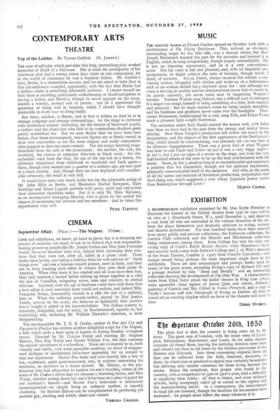CONTEMPORARY ARTS
THEATRE
Top of the Ladder. By Tyrone Guthrie. (St. James's.) THE note of self-pity which pervades this long, pretentious play evoked memories of Death of a Salesman. But at least the protkgonist of 'the American play had a strong prima facie claim on our compassion, for in the -world of commerce he was a hopeless failure. Mr. Guthrie's hero, Bertie, is a tremendous success, and we are asked to infer that in this circumstance—coupled, apparently, with the fact that Bertie had a father—there is something inherently pathetic. I cannot myself see that there is anything particularly embarrassing or disadvantagebus in having a father, and Bertie's, though he never appears on the stage, sounds a worthy, normal sort of person ; nor do I apprehend the ignominy of doing well in business, which I should have thought preferable in every way to doing badly.
But there, anyhow, is Bertie, and at first it strikes us that he is in strange company and -strange surroundings ; for the stage is cluttered with symbolical scenery (including, for the benefit of backward pupils, a ladder) and the characters who lurk in its commodious shadows peem pretty symbolical too. But we soon *alise that we have been here before, that these inconsequent, staccato figures are as firmly rooted in their own convention as are the more elegant and easily comprehen- sible puppets in drawing-room comedy. The old nanny intoning stage- directions from the side of the proscenium ; the mother, the wife, the secretary, the chorus of company directors in black coats ; the dis- embodied voice from the flies, the use of the top-hat as a totem, the arbitrary transitions from childhood to manhood and back again— these, though they seemed new a quarter of a century ago, are now part of a stock routine ; and, though they are here deployed with consider- able virtuosity, the result is very dull.
It would have been very much duller but for the admirable acting of Mr. John Mills as Bertie, and Mesdames Rachel Kempson, Mary Kerridge and Alison Leggatt perform with grace, spirit and conviction their somewhat thankless tasks. But it is only Mr. Miles Malleson, as an incompetent managing director, who is given by the author the chance of awakening our interest and our emotions ; and he takes this- opportunity very well.
PETER FLamiNG


















 Previous page
Previous page